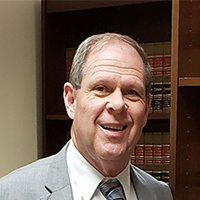 Crystal Hill RICO Act Lawyers, Virginia
Crystal Hill RICO Act Lawyers, Virginia
Sponsored Law Firm
-
 x
x

Click For More Info:
-
Price Benowitz LLP
409 7Th St Nw Suite 200 Washington, DC 20004» view mapCriminal Law Working Relentlessly For You
Our firm was built on the understanding that comprehensive representation does not begin and end in the courtroom.
202-600-9400
Not enough matches for Crystal Hill RICO Act lawyer.
Below are all Crystal Hill Criminal lawyers.
Sponsored Lawyers
1-10 of 13 matches
Accident & Injury, Divorce & Family Law, Criminal, Real Estate, Business
I first fell in love with the idea of becoming an attorney while watching fictional defense attorney Perry Mason on TV. Played by Raymond Burr, that character's no-nonsense attitude and his constant dedication to defending his clients struck a nerve. It's what made me want to commit to helping people with their legal needs. Inspired by the show, I decided to become an attorney. After attending historic Hampden-Sydney College and graduating in 1973, I attended law school at the University of Virginia, where I graduated in 1977. After being admitted to the Virginia State Bar in 1979, I opened my practice in Lynchburg that same year. That's where I've been for almost 40 years, providing dedicated and personal legal representation to many people over the years, operating under the belief that every client is deserving of understanding and respect. One of the things that bring me the greatest amount of joy from my career is knowing how many people I've helped through some really tough circumstances in their life. Hiring an attorney can be a stressful thing, which is why I try to make it as easy as possible for them. I listen to the details of their case and do my best to make sure I have the story straight before I come up with an idea of how to pursue their case. Because I've been around a long time, I can usually find some parallel or similar cases to draw inspiration from — and if there's something I haven't heard yet, I'm pretty creative when it comes to forming a legal strategy. I believe in honesty when it comes to working with my clients because we need to be able to trust one another with all the details of the case. In addition to a "never give up" attitude and perseverance, my clients can expect me to give them the unvarnished truth in regards to their legal situation and the options available. It doesn't make sense to try to sell you on something that won't work given the circumstances, after all. By establishing trust and doing everything I can to make sure my clients are respected, I've developed a pretty good track record of helping people with their problems. When I'm not working with clients, I enjoy a lot of different hobbies. In addition to being a former "Little All American" football player, I like to spend my time running, exercising, and can even be found doing a little ballroom dancing.
(more)Accident & Injury, Criminal, Traffic, Lawsuit & Dispute, Personal Injury
Mark Peake has been practicing law in the areas of personal injury, insurance defense, civil litigation, products liability, and criminal defense since 1988. He has extensive trial experience in Virginia’s state and federal courts, and he has successfully appealed a number of cases to the Supreme Court of Virginia. He is a former President of the Lynchburg Bar Association. In addition to his law practice, Mark represents Virginia’s 22nd Senate District in the Senate of Virginia, which includes the counties of Amherst, Appomattox, Buckingham, Cumberland, Fluvanna, Goochland, Prince Edward County, and parts of Louisa County and the City of Lynchburg. In the Virginia Senate, Mark serves on the Courts of Justice Committee, the Transportation Committee, the Education and Health Committee, and the Privileges and Elections Committee. Mark is a 1985 graduate of Virginia Tech, and he received his legal education at Washington & Lee University, where he was a member of the Washington & Lee Law Review.
(more)Car Accident, Consumer Rights, Divorce & Family Law, Lawsuit & Dispute, Criminal
Cary Powell Moseley graduated with a degree in English and Mathematics from the University of Virginia in 1988. While at UVA, Mr. Moseley was an Echols Scholar and Washington Scholar. Mr. Moseley received his law degree from the Washington & Lee University School of Law in 1991. Mr. Moseley was a member of the National Moot Court Team at W&L, and was a Quarterfinalist at Oral Argument and Best Brief Runner-up in the Davis Moot Court Competition. From 1991-1992, he was Judicial Law Clerk for the Honorable Norman K. Moon, then a judge on the Virginia Court of Appeals, now a Federal United States District Court judge. From 1992 to 1994, Mr. Moseley was a litigation associate at James, McElroy & Diehl, P.A. in Charlotte, North Carolina. Mr. Moseley then became an associate and then a partner in the law firm of Davidson, Sakolosky & Moseley, P.C., from 1995 until 2005, having made partner in the firm in 1997. Mr. Moseley was counsel for the plaintiff in the landmark lemon law case, Subaru of America, Inc. v. Debora Peters, 256 Va. 43 (1998), the first lemon law case decided by the Virginia Supreme Court. Mr. Moseley has been recognized as an expert in consumer law and consumer rights litigation and has testified as an expert witness in the Virginia Circuit Courts on various consumer issues as well as attorney fee issues. Mr. Moseley’s testimony has led a number of judges to award the plaintiff 100% of his or her litigation expenses. Mr. Moseley has obtained numerous six-figure settlements and jury verdicts against car dealers and insurance companies in Virginia and North Carolina, and Mr. Moseley was counsel for the plaintiff in a number of cases where the jury or judge found the car dealer or mobile home dealer committed actual fraud. Mr. Moseley is admitted to practice before the Supreme Court of the United States of America, the 4th Circuit Court of Appeals, and state and federal courts. Mr. Moseley is a member of the Virginia and North Carolina bars. An active member of the community, Mr. Moseley was voted Big Brother of the Year in Central Virginia in 1997, by Big Brothers/ Big Sisters of Central Virginia. He has served as a volunteer with Meals on Wheels, Special Olympics, Daily Bread (kitchen cleanup help and cook), and the Boonsboro Volunteer Fire & Rescue Squad. In 2006, Mr. Moseley became certified to drive ambulances and fire trucks of all shapes and sizes. Mr. Moseley has given generously of his time and money to numerous churches and charitable organizations, including the Robert Frascino AIDS Foundation, The Miller Home for Girls, United Way, Salvation Army and CASA (Court Appointed Special Advocates) and their fundraisers. Mr. Moseley is a member of First Presbyterian Church in Lynchburg, and in his youth, he was a member of First Presbyterian Church in Danville, Virginia. On June 25, 2013, the Lynchburg City Council appointed Mr. Moseley to serve a 3-year term on the City Appeals Board.
(more)


 Seth Price Washington, DC
Seth Price Washington, DC AboutPrice Benowitz LLP
AboutPrice Benowitz LLP Practice AreasExpertise
Practice AreasExpertise



